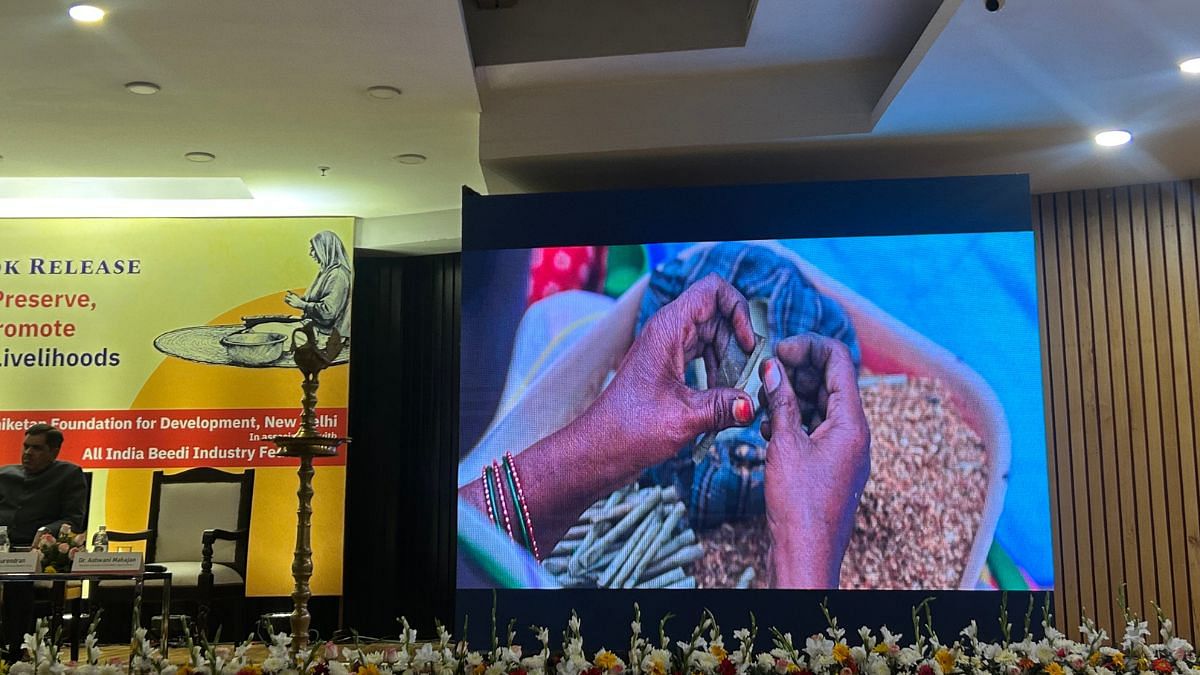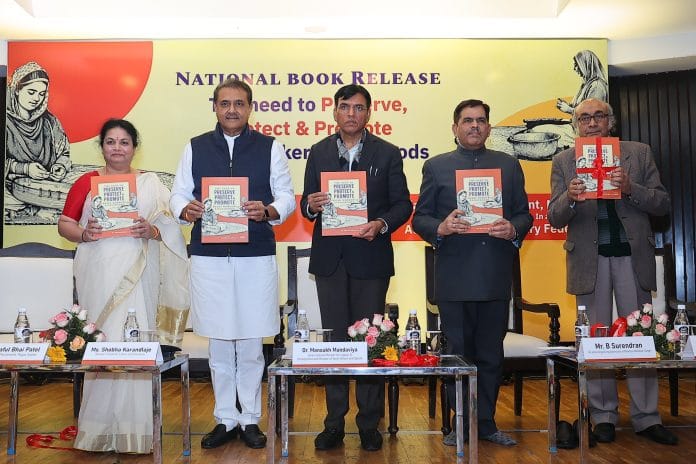New Delhi: The beedi’s harmful health impacts are well known, but its production is also an important source of livelihood, primarily for women. In a bid to raise awareness around workers who produce the country cigarette, Triniketan Foundation for Development, a non-profit working on health and family welfare, organised the launch of the book The Need to Preserve, Protect and Promote Beedi Workers’ Livelihoods.
Speaking at the event, Union Minister of Labour and Employment Mansukh Mandaviya said the Modi government was committed to the protection of the welfare of beedi workers and their families through various schemes and programmes. While emphasising that he does not promote the cigarettes, the Union minister also advocated for the reduction of the Goods and Services Tax (GST) on legal beedi makers.
“We need to understand that two types of sectors exist, organised and unorganised, which can also be called illegal. No GST is paid by these illegal workers,” Mandaviya said, adding that the reduced GST would make work easier for beedi workers.
According to a report by the Ministry of Labour and Employment, cited by Triniketan Foundation for Development, in its studies on the beedi industry, there are a total of 50 lakh registered beedi workers in India today. The majority of these workers—mainly women—are beedi rollers. The rest of the workforce includes checkers, labellers, furnace workers, contractors, as well as loaders and unloaders, it said.
Former Union minister Praful Patel acknowledged the health hazards of tobacco but underscored the importance of the beedi industry as a source of livelihood. “Eighty percent of the industry’s workforce comprises women, especially in rural areas where organised employment is scarce. For them, this is more than a job—it’s a lifeline,” he said.
Patel highlighted welfare initiatives, including ESI hospitals, provident funds, and housing schemes, that are benefiting the workers. “We must focus on empowering women and providing alternative income sources without abrupt disruption,” he urged.
Launched the book "The Need to Preserve, Protect & Promote Beedi Workers' Livelihood" in New Delhi today.
The book highlights the key aspects of Beedi workers, who play a vital role in India's informal sector. Ensuring their welfare is crucial for achieving inclusive growth. pic.twitter.com/eXD93pjKit
— Dr Mansukh Mandaviya (@mansukhmandviya) December 18, 2024
Systemic issues and challenges
The event, organised at New Delhi’s India International Centre, was attended by a number of other political leaders, including national convener of Swadeshi Jagaran Manch Ashwani Mahajan, All India organising secretary of the Bharatiya Mazdoor Sangh B. Surendran, and Solapur MP Praniti Shinde.
There was also an emphasis on the reskilling of beedi workers. Speaking at the event, Shinde raised concerns about the livelihoods of the approximately 70,000-80,000 women in Solapur who depend on the traditional beedi industry. While also acknowledging the health risks associated with tobacco consumption, the MP emphasised the socio-economic realities that bind these women to the beedi-making trade.
“I am not here to advocate tobacco consumption but I know the pain and suffering of my beedi-making sisters. If the beedi industry stops without proper rehabilitation, their lives will be devastated,” she said.

Shinde highlighted the unique challenges faced by beedi workers, including societal norms, where the possession of a beedi worker’s card influences marriage prospects for the daughters of the workers. She also pointed out the lack of viable alternative employment, particularly in rural areas where the women can work from home.
Proposing a solution, Shinde said that if the government provides sewing machines and trains beedi workers in tailoring, they can fulfil tenders for uniforms, including hospital attire. “This would create a healthy and centralised source of employment for these women,” she said.
B. Surendran, representing the trade union perspective, painted a grim picture of the industry’s struggles. “The GST increase on beedis, coupled with competition from duplicate companies, is crippling the industry. International NGOs equate beedis with other harmful tobacco products, ignoring the lower permissible nicotine levels in beedis,” he said.
He also criticised the fragmented approach of various government ministries. “The Labour ministry, health ministry…and others need to align their policies to support beedi workers and address issues comprehensively,” he added.
The book, written by Anila Nair and M.M. Rehman, was released together by the All India Bidi Industry Federation (AIBIF) and the Triniketan Foundation for Development, New Delhi.
(Edited by Sanya Mathur)







The plight of beedi workers is brilliantly captured in the song “Beedi jalai le, jigar ae piya”.
Ms. Bakhsh seems to have glossed ober this crucial element in her report.